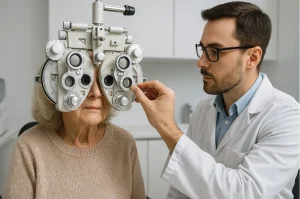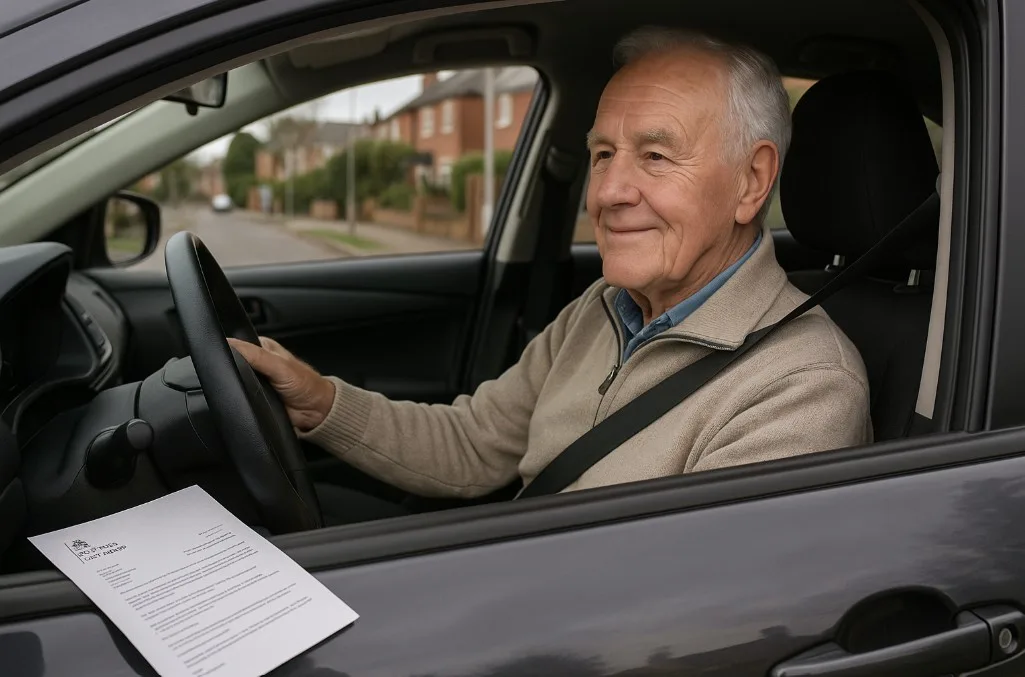Table of Contents
ToggleWhat do the latest UK seniors driving licence changes in October mean for older drivers across the country? For many people over 70, driving is more than just a means of transport it is a lifeline that provides independence, freedom, and the ability to stay socially active.
Yet, as the population ages and the number of senior drivers grows, concerns around road safety and health monitoring have become increasingly significant.
To address these challenges, the Driver and Vehicle Licensing Agency (DVLA) has introduced updated rules that place greater emphasis on medical and eyesight requirements, as well as more thorough declarations of health conditions.
The changes do not signal an end to driving for older adults. In fact, there is no upper age limit for holding a driving licence in the UK. Instead, the updates are designed to ensure that those who continue to drive remain safe and capable, while still allowing seniors to maintain their autonomy for as long as possible.
What Are the Current Rules for Driving Licence Renewal After 70?

In the United Kingdom, all drivers must renew their licence once they reach the age of 70. Unlike younger drivers, who only need to renew every 10 years, seniors are required to go through the renewal process every three years. This is not a new rule but has long been part of DVLA policy.
The renewal itself does not involve a new driving test, and many seniors find the process straightforward. Applications can be completed online through the DVLA’s official portal, which is often the fastest option, or by post using the forms supplied by the agency. Once approved, the renewed licence is valid for another three years.
However, renewal is not simply about paperwork. Seniors must confirm that they are fit to drive, which means declaring any medical conditions that could affect their safety behind the wheel. They must also meet the DVLA’s minimum eyesight requirements, including being able to read a car number plate from 20 metres away.
What Has Changed in October for Seniors Renewing Their Driving Licence?
The October update has introduced a stronger health and safety focus for older drivers. Previously, seniors were only required to self-declare their medical fitness to drive, but the new system places greater emphasis on evidence and external assessments where necessary.
The most significant change is the introduction of a risk-based approach. This means the DVLA will look more closely at drivers whose health history or age suggests a higher risk of unsafe driving. If concerns are raised, the agency can now request medical evidence from a GP or specialist before granting or renewing a licence.
In addition, there is a broader requirement for seniors to report medical conditions. Conditions such as epilepsy, strokes, neurological disorders like Parkinson’s disease, and serious visual impairments must be declared without exception. Failure to report can now result in financial penalties of up to £1,000, possible prosecution, and in serious cases, the cancellation of a driving licence.
The DVLA also has the authority to request cognitive and vision testing where necessary. This is not a blanket requirement for all seniors but applies where an individual’s medical history raises concerns. In practice, this could mean that a driver with a history of mini-strokes, for example, may be asked to undergo additional testing before their licence is renewed.
What Medical and Vision Standards Must Seniors Now Meet?

The medical and vision standards have always been central to senior licence renewals, but the October changes mean that these are now more closely monitored and enforced.
Drivers must still meet the basic eyesight rule of being able to read a car number plate from 20 metres. However, the DVLA is now more likely to ask for proof of an eye test, particularly if there is evidence of deteriorating sight. This reflects growing concerns about age-related vision problems such as cataracts, glaucoma, or macular degeneration, which can affect safe driving.
Medical reporting has also become stricter. Seniors are required to declare if they have been diagnosed with conditions that affect brain function, mobility, or reaction times. Common examples include dementia, Parkinson’s disease, epilepsy, diabetes requiring insulin, and cardiovascular problems such as strokes or heart conditions.
If the DVLA believes that more information is needed, it may request a detailed medical report from the applicant’s GP or a relevant specialist. In some cases, the agency can also require independent medical assessments. The aim is not to automatically restrict older drivers but to ensure that only those who are medically fit continue to hold a valid licence.
What Steps Should Seniors Take to Renew Their Licence Successfully?
Seniors approaching the age of 70 or renewing an existing licence need to plan carefully to avoid delays or complications. The first step is to ensure the renewal is submitted on time. The DVLA typically sends a reminder notice three months before the licence expiry date, giving drivers plenty of time to act.
Before renewing, seniors should check that they meet the eyesight requirements. Booking an eye test every two years is strongly recommended, and having proof of the results can help if the DVLA requests additional evidence.
Medical conditions must be reviewed honestly. If a senior has been diagnosed with a condition that could affect driving, it should be declared immediately. The DVLA may then request further medical evidence, but this is preferable to risking fines or losing the licence later.
Finally, seniors should keep in mind that renewals are free of charge. The only costs involved might be for new photographs or medical evidence provided by a doctor. Applying online remains the fastest way to complete the process, but postal applications are also accepted.
Does Age Alone Stop Seniors From Driving in the UK?
One of the most important aspects of the UK system is that there is no automatic ban on driving once a person reaches a certain age. Many seniors in their 80s and even 90s continue to drive safely. The focus is always on health and ability, not age alone.
The October changes reinforce this principle. Instead of removing licences based solely on age, the DVLA now applies a case-by-case assessment. This means that while some seniors may face restrictions or additional requirements, others who remain fit and healthy can continue driving without issue.
For those who do face limitations, the DVLA can issue restricted licences. These might limit driving to daytime hours or to certain types of vehicles. Such restrictions allow seniors to keep driving within safe boundaries rather than losing their licence completely.
What Happens If Seniors Fail to Meet the New DVLA Requirements?

Failing to comply with the new rules can have serious consequences. If a senior does not declare a relevant medical condition and is later involved in an accident, they could face fines, prosecution, and the immediate cancellation of their licence. Insurance cover could also be invalidated in such cases.
If an eyesight test is failed, the licence may be refused until the issue is corrected with glasses, contact lenses, or medical treatment. Similarly, if a GP report indicates that driving is unsafe, the DVLA has the power to suspend or revoke the licence.
The key message is that transparency and compliance are always in the driver’s best interest. Even if restrictions are applied, it is safer and legally sound to follow the DVLA’s guidance than to ignore it.
How Do the New Rules Compare With Previous Ones?
| Criteria | Before October | After October |
|---|---|---|
| Renewal Frequency | Every 3 years after 70 | Every 3 years (unchanged) |
| Medical Declarations | Limited | Expanded, more detailed |
| Vision Checks | Self-certified | Proof may be required |
| Cognitive Testing | Rarely used | Applied for at-risk cases |
| Licence Restrictions | Rarely applied | May include conditions (e.g., daytime driving) |
| Penalties for Non-Reporting | Limited enforcement | Fines up to £1,000 and licence loss |
This table highlights that while the renewal frequency has not changed, the depth of medical and vision scrutiny has increased significantly.
How Can Seniors Prepare for the October Changes and Beyond?
Preparation is the best way to avoid stress when renewing a driving licence at 70 or beyond. Seniors should book regular health and vision checks, keep records of their medical history, and be proactive in reporting any new diagnoses. By applying early ideally at least a month before the licence expires, they can reduce the risk of delays.
Engaging with GPs or specialists before the DVLA requests evidence can also make the process smoother. Many older drivers also benefit from refresher driving courses, which provide reassurance and help maintain safe driving habits.
For those who eventually find driving too challenging, it is important to remember that alternatives exist. Community transport services, senior-friendly taxis, and discounted public transport schemes are available to support mobility and independence.
What Support Is Available for Older Drivers in the UK?

The UK government and charities have recognised the challenges seniors face with these changes and provide a range of resources. The DVLA’s website offers clear step-by-step instructions for renewal and guidance on medical conditions that must be reported.
Driving Mobility Centres across the UK provide assessments and advice for seniors who are unsure about their fitness to drive. Age UK also offers guidance, including information on transport alternatives. Community-based transport schemes are growing in popularity, offering affordable and accessible services to those who can no longer drive.
Conclusion
The October driving licence changes for seniors mark an important shift in how the UK balances independence with road safety.
While there is still no upper age limit for driving, renewal after 70 now requires more detailed medical declarations, possible GP or specialist reports, and stricter eyesight checks. The DVLA’s risk-based approach ensures that only those who are fit to drive remain on the road, while also allowing restricted licences where appropriate.
The key takeaway for seniors is that preparation and honesty are essential. Renewing on time, undergoing regular health and vision tests, and promptly reporting new conditions will make the process straightforward. By doing so, older drivers can continue to enjoy the freedom of the road while keeping themselves and others safe.
FAQs
Do seniors have to take a driving test again at 70?
No. Seniors are not required to retake a driving test. Licence renewal is based on medical and vision checks rather than driving ability.
How often do over-70s need to renew their licence?
Every three years after reaching the age of 70.
What medical conditions must be reported to the DVLA?
Conditions such as dementia, epilepsy, diabetes requiring insulin, strokes, Parkinson’s disease, and significant visual impairments must be declared.
Can the DVLA impose restrictions instead of cancelling a licence?
Yes. Licences can be restricted, for example, to daytime driving or certain vehicle categories, rather than being revoked entirely.
What are the penalties for not declaring a medical condition?
Failing to declare can result in fines up to £1,000, prosecution, and the withdrawal of the licence.
Do seniors need to provide proof of an eye test?
Not in all cases, but the DVLA may request evidence if there are concerns about vision.
Can a GP stop an elderly driver from renewing their licence?
A GP can provide medical evidence or report to the DVLA if they believe driving is unsafe. The final decision lies with the DVLA.




